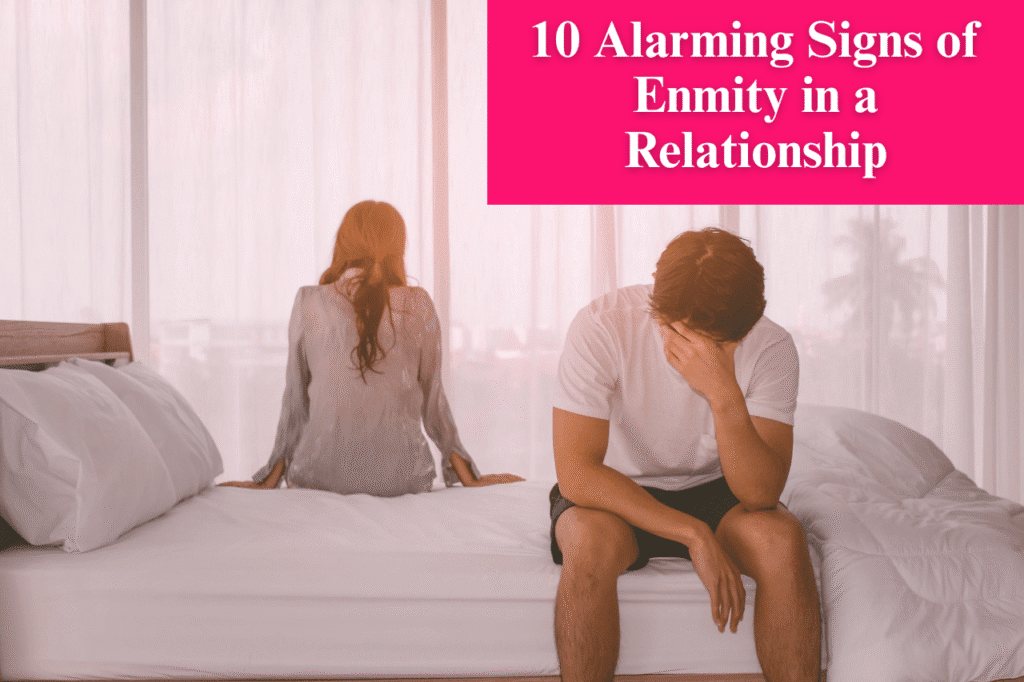It’s a painful truth that not all relationships are destined to thrive.
Sometimes, the very connection that once brought joy begins to fray, leaving behind a landscape of hurt and confusion.
We often miss the subtle shifts, the quiet erosion of trust and affection, until we’re standing in the ruins of what we thought was strong.
Recognizing the signs of enmity in a relationship is crucial, but it’s a difficult path to walk.
It requires confronting the possibility that the person you care about might be becoming someone who brings you pain rather than peace.
And here’s the thing; the enmity doesn’t always start with shouting matches or slammed doors.
More often, the early signs of a toxic relationship show up in subtle, soul-draining ways like passive-aggressive remarks, lack of emotional support, or a growing sense of isolation.
These red flags are easy to ignore when you’re still holding onto hope, but recognizing them could be the first step toward healing.
In this post, we’ll walk you through 10 signs of an unhealthy relationship, offering a clearer picture of how enmity manifests and how you might begin to move forward.
Table of Contents
ToggleWhat is Enmity in a Relationship?
Enmity in a relationship refers to a deep-seated hostility, resentment, or ill will between partners.
It goes beyond normal conflicts or disagreements and often involves a consistent pattern of negative emotions and behaviors.
When enmity takes root, love and respect are replaced by bitterness, distrust, and emotional distance.
Instead of facing challenges together, partners in a relationship marked by enmity often see each other as adversaries, working against one another rather than as a team.
This can manifest as constant criticism, sabotage, lack of support, or a general atmosphere of tension and mutual dislike.
10 Heartbreaking Causes of Enmity in a Relationship
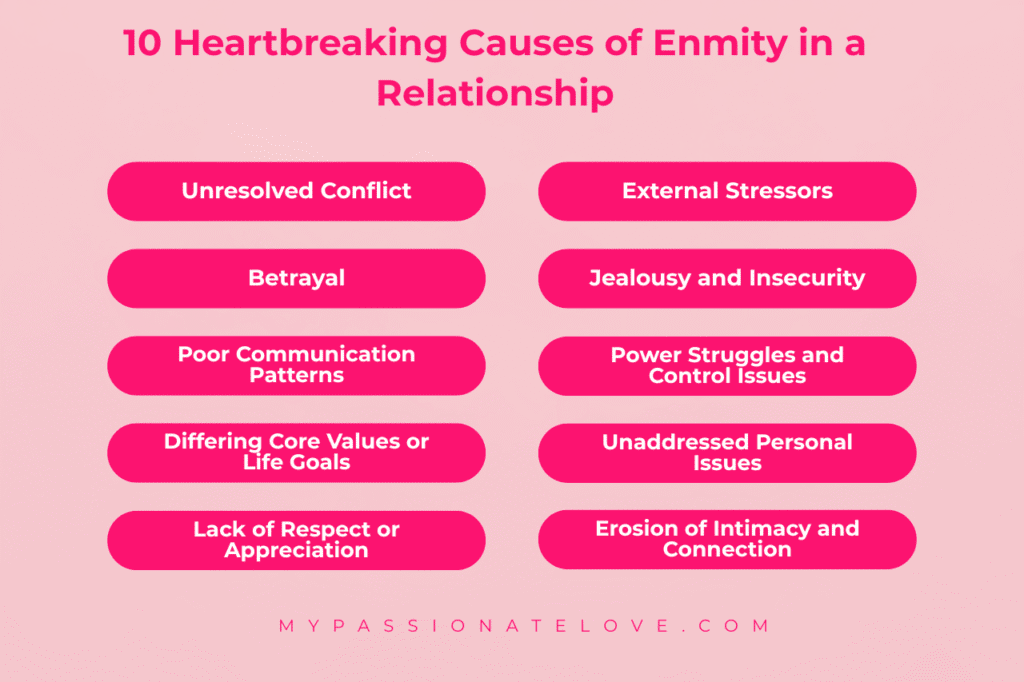
What causes unhealthy relationships to devolve into states of deep-seated ill-will and opposition? Often, it’s a complex interplay of unresolved issues and destructive dynamics that fester over time. Here are some common causes of enmity in a relationship:
1. Unresolved Conflict
Allowing disagreements and hurts to pile up over time without healthy resolution creates a reservoir of resentment and anger.
2. Betrayal
Acts like infidelity, significant dishonesty, or breaking fundamental promises can shatter trust and introduce deep-seated bitterness.
3. Poor Communication Patterns
A lack of effective communication, coupled with patterns like yelling, shutting down, defensiveness, or contempt, prevents issues from being addressed and escalates tension.
4. Differing Core Values or Life Goals
Fundamental disagreements on important aspects of life, such as finances, family planning, religion, or lifestyle choices, can lead to persistent conflict and resentment if not navigated with compromise and respect.
5. Lack of Respect or Appreciation
When partners feel consistently disrespected, taken for granted, or unappreciated, it erodes the foundation of goodwill and can breed contempt.
6. Power Struggles and Control Issues
Attempts by one partner to exert excessive control over the other, or constant vying for dominance, creates an adversarial dynamic.
7. Unaddressed Personal Issues
Individual mental health challenges, substance abuse, or unresolved personal trauma that impact behavior within the relationship can significantly contribute to negative interactions and resentment.
8. External Stressors
Chronic stress from finances, work, family issues, or health problems can strain the relationship and exacerbate existing vulnerabilities if the couple doesn’t manage stress together effectively.
9. Erosion of Intimacy and Connection
A gradual decline in physical and emotional intimacy can leave partners feeling distant, lonely, and resentful, creating fertile ground for negativity.
10. Jealousy and Insecurity
Unchecked jealousy or deep personal insecurity can manifest as controlling behavior, accusations, and a constant need for reassurance, fueling conflict and mistrust.
10 Signs of Enmity in a Relationship
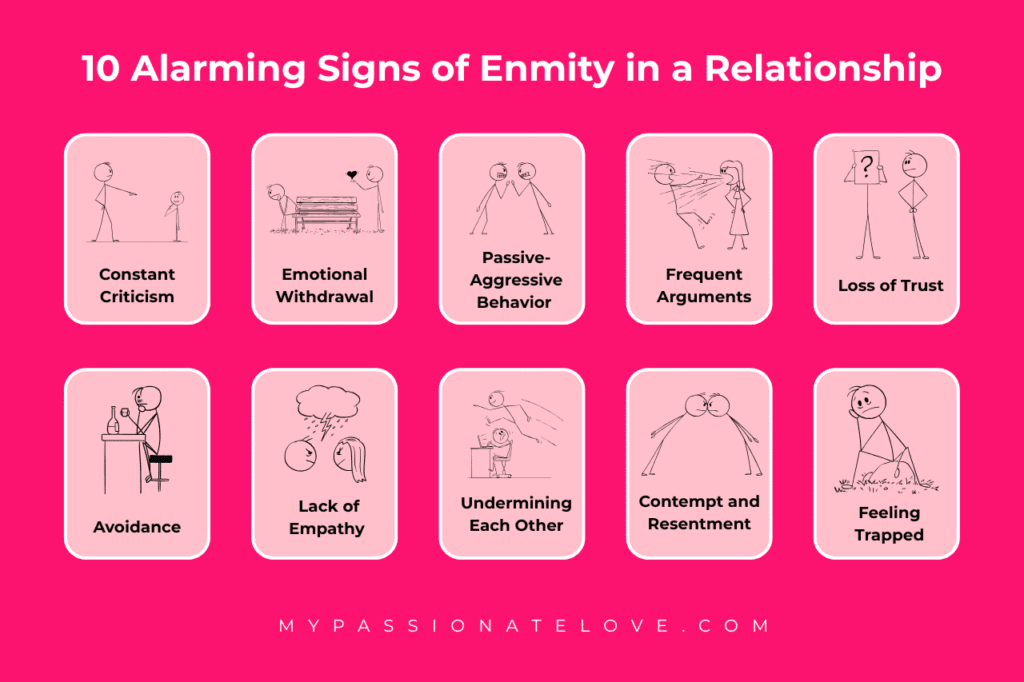
What are the warning signs of an unhealthy relationship? Most people think of yelling, cheating, or constant fights, but enmity can be much quieter, and far more dangerous. If you’re noticing the following signs, it could mean there’s a deeper issue beneath the surface.
1. Constant Criticism
In a healthy relationship, partners offer constructive feedback to help each other grow. But when criticism becomes constant and harsh, it’s no longer helpful. It’s damaging.
Constant criticism is one of the earliest and most painful signs of enmity in a relationship.
It often begins subtly: a comment about your cooking becomes criticism about your attention to detail, which evolves into broader statements about your competence or worth.
The critic may disguise these barbs as “just trying to help you improve,” but the underlying message becomes clear: you are fundamentally flawed and inadequate.
What makes constant criticism particularly destructive is how it erodes self-esteem over time.
When you consistently hear negative assessments about yourself from someone whose opinion you value, you may begin to internalize these judgments.
Research shows this is one of the earliest signs of a loveless relationship that predicts long-term dissatisfaction and failure of the partnership.
The criticism rarely exists in isolation. It often appears alongside other problematic behaviors like comparisons to others, dismissal of accomplishments, or public humiliation.
The recipient of such criticism eventually develops a form of hypervigilance, constantly monitoring their behavior to avoid triggering another critical episode.
This exhausting state perpetuates a cycle where authentic expression becomes impossible, and the relationship’s emotional connection withers under the weight of perceived inadequacy.
2. Emotional Withdrawal
Emotional withdrawal is often a quiet but powerful indicator of a broken connection.
It happens when one or both partners start pulling away, either because they feel hurt, hopeless, or simply no longer care.
Conversations become shallow, moments of intimacy are replaced with silence, and there’s an overwhelming sense of distance.
You might sleep in the same bed, live in the same home, but emotionally, you’re miles apart.
This disconnection can stem from unresolved conflict, unmet needs, or a buildup of resentment that’s never been addressed.
Emotional withdrawal isn’t always loud or obvious; it often hides in busy schedules, long silences, and constant distractions. But its impact is deep.
When someone stops sharing their thoughts, feelings, or dreams with their partner, the emotional safety of the relationship disappears. Without that safe space to connect, love begins to suffocate.
Recognizing emotional withdrawal early is key to salvaging what’s left before it becomes complete emotional detachment.
3. Passive-Aggressive Behavior
When people can’t, or won’t, communicate openly, resentment often leaks out in indirect ways.
Passive-aggressive behavior is a hallmark of unhealthy dynamics, where anger is expressed through sarcasm, backhanded compliments, or the silent treatment instead of honest discussion.
For example, instead of saying, “I’m upset you forgot our plans,” they might say, “Oh, don’t worry about me, I’m used to being disappointed.”
Rather than addressing an issue, they give the cold shoulder for days, leaving their partner confused and hurt.
This behavior creates a toxic cycle of miscommunication.
The passive-aggressive partner avoids confrontation but still makes their displeasure known, while the other person is left guessing what went wrong.
Over time, this erodes trust and breeds frustration.
Passive-aggression often stems from fear of conflict or an inability to express emotions healthily.
It’s one of the most common toxic relationship signs and a warning that resentment is taking root.
4. Frequent Arguments
Every couple argues; it’s a normal part of navigating differences. But when disagreements turn into relentless battles, where the goal is to “win” rather than resolve, it’s a clear sign of enmity in a relationship.
Frequent arguments that follow the same destructive patterns (yelling, name-calling, bringing up past mistakes) create a war zone instead of a partnership.
The problem isn’t the conflict itself, but how it’s handled. Healthy couples argue to understand each other better; toxic couples argue to dominate or punish.
They may argue over trivial matters, escalate quickly, and use hurtful language that cuts deeper than the issue at hand.
The goal becomes proving dominance or defending pride rather than understanding each other’s perspectives.
Over time, this pattern creates a hostile atmosphere where both individuals walk on eggshells, anticipating the next blowup.
Moreover, these arguments tend to repeat the same themes because the underlying problems aren’t being addressed. Instead, they’re being rehashed without progress.
This pattern creates emotional exhaustion, where both individuals dread conversations because they know it will end in shouting or sulking.
It also erodes emotional safety, making it hard for either person to feel heard or validated.
5. Loss of Trust
Trust is the cornerstone of any healthy relationship, and once it begins to erode, everything else starts to crumble.
When there’s a loss of trust, partners no longer feel safe or secure with one another.
This can stem from various sources like broken promises, dishonesty, betrayal, or even repeated emotional neglect.
The damage isn’t always dramatic; sometimes it’s subtle, like noticing your partner avoids answering direct questions or seems emotionally distant when you try to connect.
Over time, suspicion takes hold. You might find yourself checking their phone or social media obsessively, doubting their promises, even over small things or feeling anxious when they’re out without you.
On the flip side, the person who’s been untrustworthy may grow defensive or resentful, feeling constantly accused or monitored. Either way, the relationship becomes strained by a persistent sense of uncertainty.
This loss of trust is one of the early qualities of an unhealthy relationship because it signals that honesty and emotional safety are no longer priorities.
Without trust, love cannot thrive; it can only survive on shaky ground, leaving both partners emotionally drained and disconnected.
6. Avoidance
When a relationship is hurting, some people don’t fight; they flee.
Avoidance shows up as dodging conversations, spending less time together, or even finding excuses to be away from home. It’s different from needing healthy space; it’s a withdrawal from the relationship itself.
You might notice your partner is suddenly “too busy” for dates or deep talks, they seem more engaged with friends, work, or hobbies than with you, or important discussions are always postponed with “Not now” or “We’ll talk later.”
On the surface, everything might seem peaceful, but beneath the silence is discomfort, fear, or even contempt.
Avoidance doesn’t solve problems; it buries them. And eventually, those buried issues grow into full-blown emotional distance.
If you’re avoiding each other more than you’re seeking connection, it’s not just a sign of stress. It’s a sign of enmity in the relationship.
Avoidance communicates, “I don’t want to deal with you,” and when that becomes the norm, the relationship stops being a place of intimacy and becomes a place of retreat.
7. Lack of Empathy
One of the most heartbreaking signs of an unhealthy relationship is when partners stop caring about each other’s emotional worlds.
A lack of empathy shows up when one person dismisses the other’s feelings, downplays their pain, or responds with indifference instead of support. You might share something vulnerable, only to be met with indifference, impatience, or even blame.
For example, you may express sadness, and they respond with, “You’re too sensitive,” you may celebrate an achievement, and they brush it off, or they may prioritize their own needs while ignoring yours, even in difficult times.
This lack of emotional support creates a profound sense of isolation and invalidation.
Over time, the person on the receiving end may begin to suppress their emotions altogether, feeling unsafe or unimportant.
In healthy relationships, empathy strengthens connection and fosters mutual care.
Its absence does the opposite; it breeds coldness, resentment, and emotional abandonment. This is not only emotionally painful but also deeply corrosive to intimacy.
A relationship without empathy is like a home without warmth; functional perhaps, but devoid of comfort and belonging.
8. Undermining Each Other
When a relationship turns hostile, partners may begin to sabotage each other’s confidence, goals, or successes, either openly or in subtle, insidious ways.
This undermining behavior is a clear sign of enmity in a relationship and reflects a shift from being each other’s support system to becoming each other’s obstacles.
One partner might mock the other’s ambitions, downplay their achievements, or criticize their decisions behind closed doors.
Sometimes, it happens in more indirect ways like forgetting important deadlines, responding negatively to good news (or giving backhanded “compliments” like, “Wow, you actually did something right for once,”), or creating tension before a major event.
What makes this particularly hurtful is that it comes from someone who was once supposed to be a cheerleader.
The emotional impact is significant: self-doubt grows, motivation fades, and the joy of personal success becomes overshadowed by fear of judgment or sabotage.
This kind of dynamic is not just unhealthy; it’s emotionally abusive. It erodes a person’s sense of self-worth and autonomy, making them question whether they deserve both love and success.
When undermining becomes a pattern, it signals that the relationship no longer nurtures growth but instead thrives on control and insecurity.
9. Contempt and Resentment
Contempt is often described as the single greatest predictor of relationship failure, and when combined with long-standing resentment, it becomes one of the most toxic elements in a partnership.
Contempt shows up as sarcasm, eye-rolling, name-calling, or any behavior that conveys superiority and disdain.
It’s different from anger because it carries a sense of moral high ground; you’re not just upset with your partner, you see them as beneath you.
Resentment, on the other hand, is the lingering bitterness that builds when issues go unresolved.
Over time, small grievances pile up into a deep well of anger and disappointment, affecting every interaction.
Together, contempt and resentment create a hostile environment where kindness and respect have little room to survive.
Partners begin treating each other not as equals in love but as adversaries in a long-standing battle.
These are among the most glaring signs of enmity and toxic relationship examples because they reflect a complete breakdown in emotional safety and regard.
When a couple reaches this stage, everyday interactions feel charged with animosity, and moments of tenderness become rare exceptions rather than the norm.
10. Feeling Trapped
Perhaps the most emotionally devastating sign of an unhealthy relationship is the feeling of being trapped.
This occurs when one or both partners sense that there is no healthy way forward, whether due to emotional dependency, financial entanglement, shared responsibilities, or fear of being alone.
The relationship becomes a source of ongoing tension, dissatisfaction, and even dread, yet escaping feels impossible.
This trap can manifest in many ways: staying together “for the kids,” clinging to routines out of habit, or fearing what life would look like outside the relationship.
Feeling trapped is a powerful red flag because it signals that the relationship is no longer a place of freedom and joy, but rather a cage built from emotional obligation and fear.
What makes this especially harmful is the erosion of personal agency; one ceases to feel like they have a choice, which leads to increased helplessness, bitterness, and even depression.
This is one of the most advanced and painful signs of enmity in a relationship, often indicating that years of unaddressed issues have left the bond beyond repair.
How to Address Enmity in a Relationship: 7 Tips
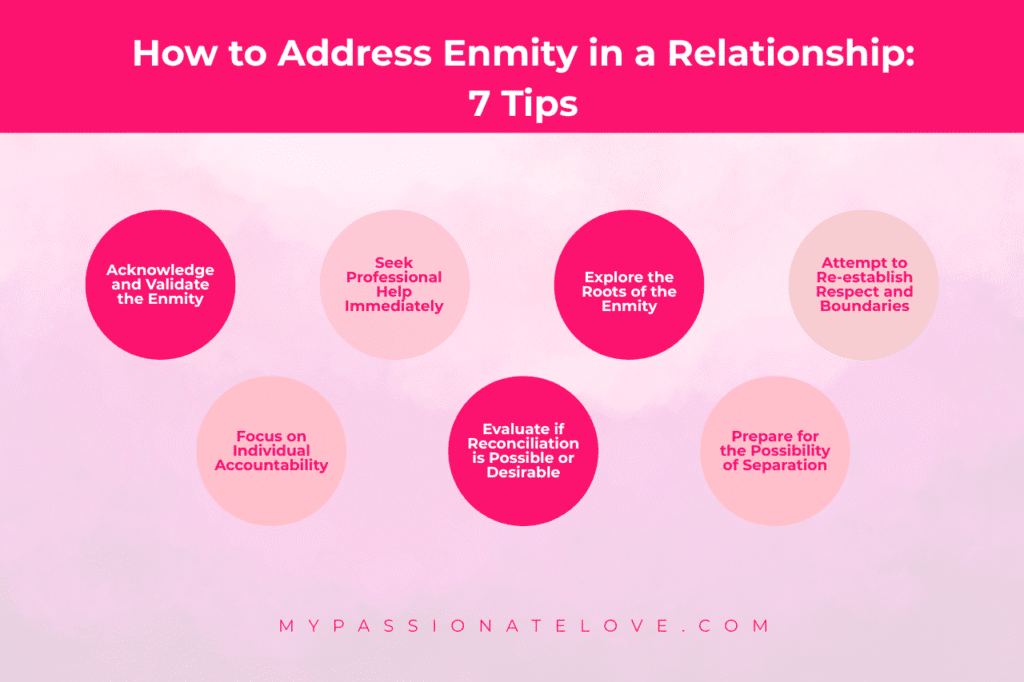
Facing enmity in a relationship is emotionally painful, but it’s also a crucial turning point. Ignoring it only deepens the divide, but addressing it with honesty and courage can open the door to healing. Here’s how to begin:
1. Acknowledge and Validate the Enmity
The first crucial step is for both partners (if possible) to recognize and admit that a state of enmity exists.
This isn’t just about acknowledging arguments, but the presence of deep-seated ill-will, resentment, or hostility.
Avoid downplaying the severity or blaming the other person entirely. Validating the pain and negativity is the grim starting point.
2. Seek Professional Help Immediately
Attempting to navigate deep-seated enmity without professional guidance is incredibly difficult and often unsuccessful.
Couples counseling or therapy is highly recommended.
A skilled therapist can provide a safe space to explore the origins of the enmity, mediate communication, identify destructive patterns, and teach healthier ways to interact.
Individual therapy may also be necessary for each partner to address their own contributions to the dynamic, such as unresolved trauma, communication deficits, or personal issues fueling the hostility.
3. Explore the Roots of the Enmity
Understanding why the enmity developed is vital, though painful.
Was it a specific betrayal, a long history of unresolved conflict, a fundamental incompatibility, or a slow erosion of respect?
Identifying the core issues requires painful honesty and a willingness to look beyond the surface-level arguments to the deeper unmet needs, hurts, and resentments.
4. Attempt to Re-establish Respect and Boundaries
Even if positive feelings are dormant, a baseline of mutual respect is necessary if there’s any hope of recovery.
This involves setting clear boundaries about communication (e.g., no yelling, no personal attacks), respecting physical and emotional space, and committing to treating each other with basic dignity, even when disagreeing.
This is incredibly hard when enmity is present but essential for creating an environment where healing might begin.
5. Focus on Individual Accountability
Both partners likely contributed to the breakdown. Each person needs to take responsibility for their own actions, communication patterns, and contributions to the negative dynamic, rather than solely focusing on the other’s faults. This individual accountability is a cornerstone of rebuilding.
6. Evaluate if Reconciliation is Possible or Desirable
Healing from enmity is a long and arduous process with no guarantee of success.
Both partners must honestly assess if they are willing and able to put in the significant work required.
Sometimes, the damage is too profound, and the will to change is absent. It’s a painful truth that not all relationships marked by enmity can or should be saved.
7. Prepare for the Possibility of Separation
It is critical to recognize that despite best efforts, enmity can be irreparable.
If the hostility is entrenched, if there is no willingness from one or both partners to change, or if the relationship has become a source of ongoing trauma, separation or ending the relationship may be the healthiest path forward for both individuals.
Therapy can also help navigate the difficult process of conscious uncoupling if reconciliation isn’t possible.
Addressing enmity requires confronting deep pain and difficult truths. It’s a journey that prioritizes emotional safety and well-being, whether that ultimately means rebuilding the relationship on a new foundation or finding a path towards a respectful separation.
How Do You Tell If You Are The Problem in a Relationship?
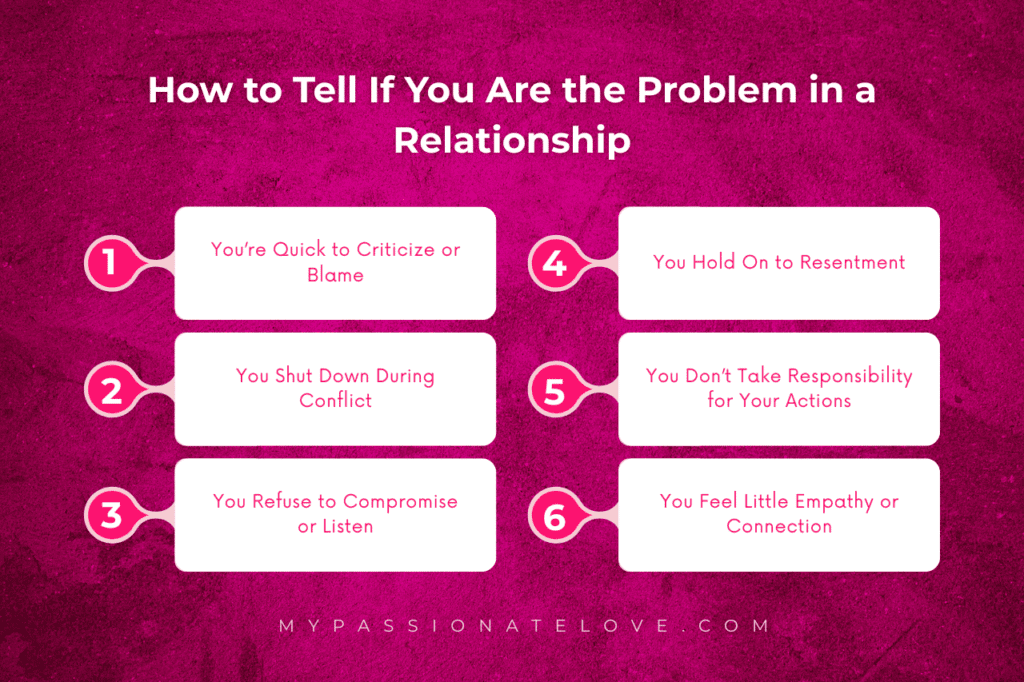
It’s not easy to admit, but sometimes the pain we feel in a relationship is partly pain we’ve caused. If you’re willing to ask yourself this question, you’re already doing something most people don’t: taking responsibility. Being “the problem” doesn’t mean you’re a bad person; it means there are patterns or behaviors that might be contributing to the conflict.
Here are a few signs to help you reflect honestly:
1. You’re Quick to Criticize or Blame
Healthy relationships involve mutual respect, even during disagreements.
If you find yourself habitually pointing fingers, nitpicking your partner’s behavior, or using harsh language without considering how your words affect them, it could be a sign that you’re fueling conflict.
Constant criticism not only shuts down communication but also makes your partner feel unvalued, a dynamic often seen among the signs of enmity in a relationship .
Ask yourself:
- Do I attack my partner’s character instead of addressing the actual issue?
- Am I open to hearing how my words make them feel?
2. You Shut Down During Conflict
Avoiding difficult conversations or emotionally withdrawing when tensions rise is a common response to stress, but it can leave your partner feeling abandoned or unheard.
While you may believe you’re giving space or protecting yourself, this behavior often creates more distance than resolution.
Ask yourself:
- Do I walk away from arguments without trying to resolve them?
- Does my silence or coldness make my partner feel like they’re fighting alone?
3. You Refuse to Compromise or Listen
A healthy relationship thrives on balance, cooperation, and empathy.
If you consistently prioritize your needs over your partner’s and resist seeing things from their perspective, it can create resentment and emotional imbalance.
Relationships require give and take; if you’re always pushing for your way, you may be unintentionally creating power struggles.
Ask yourself:
- Am I willing to hear my partner out, even when I don’t agree?
- Do I validate their feelings, or do I dismiss them as irrelevant?
4. You Hold On to Resentment
Holding onto past grievances and bringing them up during current arguments is a sign of unresolved hurt, and it can poison future interactions.
When resentment builds, it colors every conversation and prevents both partners from moving forward.
This kind of emotional baggage is one of the most common characteristics of an unhealthy relationship, especially when forgiveness and resolution are absent.
Ask yourself:
- Do I bring up old issues to “win” an argument?
- Have I truly forgiven past hurts, or am I still punishing my partner for them?
5. You Don’t Take Responsibility for Your Actions
Denial, deflection, and justification are defense mechanisms that prevent real growth.
It’s natural to want to protect your ego, but refusing to acknowledge your mistakes, or turning every concern into an accusation against your partner, stops progress in its tracks.
Healthy relationships depend on accountability.
Ask yourself:
- Do I own my mistakes, or do I blame my partner for how I behave?
- Am I defensive when confronted, or can I listen without becoming hostile?
6. You Feel Little Empathy or Connection
If you’ve stopped caring about your partner’s feelings, needs, or well-being, or if you view them more as an obstacle than a teammate, it may signal deeper personal or relational issues.
A lack of empathy is one of the most telling signs of a toxic person, revealing a fundamental disconnect.
Ask yourself:
- Do I care how my actions impact my partner?
- Have I become emotionally indifferent or numb toward our bond?
Related Posts
Final Thoughts
Recognizing the signs of enmity in a relationship is painful, but it’s also the first step toward healing; whether that means repairing the bond or finding the courage to walk away.
Love should never leave you feeling small, drained, or alone. If you see the above toxic patterns in your relationship, ask yourself: Is this how I want to live? Is this the love I deserve?
You have a choice. Some relationships can be rebuilt with honesty, effort, and professional help. Others have run their course, and that’s okay too.
Whatever path you take, remember: your well-being matters. You deserve a love that feels safe, kind, and whole; not one that slowly dims your light.

